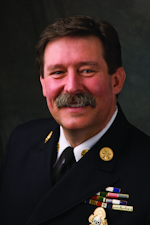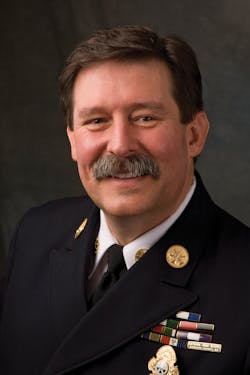Fire Law: Cancer Presumption Laws: Data- or Policy-Driven
The debate over cancer presumption laws for firefighters has raged on for decades. Both sides—labor and management—have pointed to data to support their respective positions, with each making rational arguments based upon their spin on the data. Numerous lawsuits over the coverage of cancer as a line-of-duty illness leave us at the same loggerheads we were at 45 years ago.
Some are now advocating that after a fire, turnout gear be treated like a hazardous material, pointing to new data on the potential for carcinogens to be absorbed through the skin. The 2018 edition of NFPA 1500: Standard on Fire Department Occupational Safety and Health Program recommends that firefighters who are exposed to “toxic fireground contaminants” be required to use wet wipes at the scene to clean exposed skin and take soap and water showers within one hour of the incident. The standard goes so far as to advocate training on how to doff contaminated gear so as to avoid the risk of cross-contamination. All this while courts remain unconvinced—and are perhaps inconvincible—of a clear nexus between cancer and firefighting.
There are two perspectives that need to be considered when it comes to cancer presumption laws.
1. Whether the data supports a connection between firefighting and cancer that justifies presumption laws.
2. Whether cancer presumption laws make sense from a policy perspective.
Unfortunately, the fire service seems to be mired in an unwinnable battle over the data while ignoring a frank discussion on the policy considerations that, standing alone, justify cancer presumption laws. Let’s look at the two perspectives.
Scientific data on firefighter cancer rates
While there is data that suggests that firefighters are at increased risk for developing certain types of cancer, the data is not so conclusive as to be able to establish that a given cancer in a given firefighter is causally related to firefighting in a way that would stand a serious chance of winning a contested case in court.
That is not to say there is no data or even a lack of data. There is good data, and there are a lot of explanations about why the current data will probably never be conclusive enough for a court, but the bottom line is we do not have the kind data that a court would require to prove that a given cancer in a given firefighter is job related. That, in a nutshell, is the very reason why presumption laws are necessary in the first place.
It is no surprise that those opposed to cancer presumption laws use the same rationale used by trial lawyers in an individual case to argue against the adoption of presumption laws. City officials responsible for managing the public’s finances can easily poke holes in the available data, much like the tobacco industry was able to poke holes in the cancer/cigarette debate for many years. It didn’t change the underlying truth. The truth is the truth. However, the absence of conclusive data allows those so inclined to evade acknowledgement of the truth. It reminds me of the Stuart Chase quote: “For those who believe, no proof is necessary. For those who don't believe, no proof is possible.”
Policy—a social compromise
Under the social compromise approach, city officials and firefighters acknowledge an undeniable truth: Firefighters are routinely exposed to carcinogens in the course of their duties. Firefighters understand that as part of their employment, they will repeatedly be exposed to cancer-causing agents and conditions. In exchange, the community agrees that if a firefighter develops cancer, it will be treated as a line-of-duty injury/illness. The agreement is a social compromise that is not dependent upon the cancer-causation data, but rather is focused on the risk.
The best-known example of a social compromise is workers compensation. Prior to workers comp, injured employees were on their own when hurt or sickened at work. Employers were free to stop paying employees as soon as they stopped working and had no obligation to rehire them when their injuries were healed. Injured workers relied upon their savings or their family to survive.
Badly injured workers faced with becoming destitute would be forced to sue their employer or coworkers for negligence just to survive. Some of the cases were filed on frivolous grounds by desperate plaintiffs, tainting public perception of all who sued. Employers fought all cases tooth and nail, often prevailing even in meritorious cases by grinding the employee financially. Once an employee opted to sue an employer, they would find it virtually impossible to find other employment once healed. It was a cruel system.
Workers comp gave injured employees financial protection and, in turn, it gave employers relief from negligence suits by employees. Most importantly, it made workplace injuries and illnesses a cost of doing business for the employer, not an economic burden to be shouldered by an individual employee and their family.
The social compromise approach to cancer presumption laws should best be viewed by city officials and taxpayers as an economic decision. Cancer is a disease that has tremendous costs, personally, emotionally and financially. While the personal and emotional costs of cancer cannot be transferred from employee to employer, the financial risks associated with cancer can. The question under the social compromise approach is: Who is in a better position to manage the financial risks associated with a diagnosis of cancer—an individual firefighter and their family or a municipal employer funded by taxpayers?
Viewed in this light, it makes sense that the risk of cancer in firefighters be considered a cost of doing business for fire departments as opposed to being a risk for the individual firefighter and their family to bear. It is a risk that can be insured against or, at a minimum, budgeted for.
Before someone accuses me of trivializing the risk of cancer in firefighters to an economic level, let me make one important comment on the social compromise approach: I understand that to firefighters cancer presumption is so much more than an economic issue. It is an acknowledgement that their employer recognizes the risks that firefighters confront every day and agrees to take care of the firefighter and their family should the risk become reality. But the argument must make sense to elected officials and the larger tax-paying public as well. The social compromise approach does that. It gets us out of the endless debates about the inconclusiveness of the data.
To city managers and elected officials who scoff at the suggestion of a social compromise, consider this: If you were to be dipped in a vat of carcinogens (let’s say a big vat of the insecticide Malathion) and 20 years later you develop cancer, is it fair that those who placed you in that vat will be able to argue to a jury: “Too bad but this city official can’t prove that our dipping them in that vat 20 years ago caused their cancer. The data is too speculative.”
Notwithstanding that, would you willingly dip yourself in the vat of carcinogens again the next day? And again, the day after? And the day after? That is what firefighters are doing when they go to fires. They are exposing themselves to carcinogens, many of which we do not even know are there because of the evolving nature of fires. Firefighters do this over and over again for 20 to 30 years.
Peace of mind
To me, at least until the data is more conclusive (understanding it may never be conclusive enough for some), a policy-based approach is the strongest argument for cancer presumption laws for firefighters. Regardless of our ability to prove or disprove the connection between exposures and cancer in a given case, the undisputed fact is that firefighters are being exposed to carcinogens every day.
Cancer presumption laws offer some peace of mind to the firefighters and those who depend on the firefighters that if they develop cancer they will be covered as a line-of-duty illness. Cancer presumption laws put the risk of catastrophic medical expenses on the party that is most able to bear the financial burden, and in turn remove it from the party that is least able. In doing so, cancer presumption laws make sense from a public policy perspective.

Curt Varone
CURT VARONE has more than 40 years of experience in the fire service, including 29 years as a career firefighter with Providence, RI, retiring as a deputy assistant chief (shift commander). He is a practicing attorney who is licensed in Maine and Rhode Island and served as the director of the Public Fire Protection Division at the NFPA. Varone is the author of two books, "Legal Considerations for Fire and Emergency Services" and "Fire Officer's Legal Handbook," and remains active as a deputy chief in Exeter, RI.






